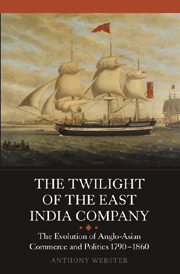
- Publisher:
- Boydell & Brewer
- Online publication date:
- September 2012
- Print publication year:
- 2009
- Online ISBN:
- 9781846157745
- Subjects:
- Area Studies, South Asian History, Asian Studies, History

This book examines the development of British commercial, financial and political relations with India and the Far East during the final period of the East India Company's reign as the sovereign power in India. This was a most turbulent period for British commerce with India. The period began with the renewal of the East India Company's Charter and its component monopolies of trade with India and China, but this was quickly followed by the outbreak of the Napoleonic Wars, which spread to the east and saw the completion of Britain's assertion of power over India and much of Southeast Asia. However, the war also strengthened those political forces in Britain campaigning against the Company's monopolies of trade with India and China, which were consequently abolished under the Charter Acts of 1813 and 1833. The spectacular growth of the British economy following industrialisation brought new forces to bear upon India, with the rise of manufactured exports to the east. But the course of commercial relations did not run smoothly, and economic crises in Britain and India in 1833 and 1848 swept away commercial firms in both countries, and caused severe economic retrenchments. This instability severely hampered efforts to facilitate the export of capital to India during the first half of the century. Finally the rebellion of 1857 spelt the death knell for the Company, and ushered in a new phase of Anglo-Indian economic relations, in which British foreign investment grew substantially. Anthony Webster is Head of the History Department at Liverpool John Moores University.
[An] excellent new book. [...] Many historians will find valuable new insights in these pages.'
Source: Asian Affairs
Makes an important contribution to our understanding, not only of British imperialism in general, but also of the way in which the transition between mercantilism and liberalism actually took place and the nature of the challenges that the free market economy created.'
Source: International Journal of Maritime History
Mines new territory by delving into the sparsely explored role played by British commercial and industrial pressure groups in Manchester, Glasgow and Liverpool in challenging the East India Company's monopoly in Asian trade. [...] This well researched and written book adds an important bookend to the history of the East India Company's demise. Highly Recommended.'
Source: Choice
 Loading metrics...
Loading metrics...
* Views captured on Cambridge Core between #date#. This data will be updated every 24 hours.
Usage data cannot currently be displayed.